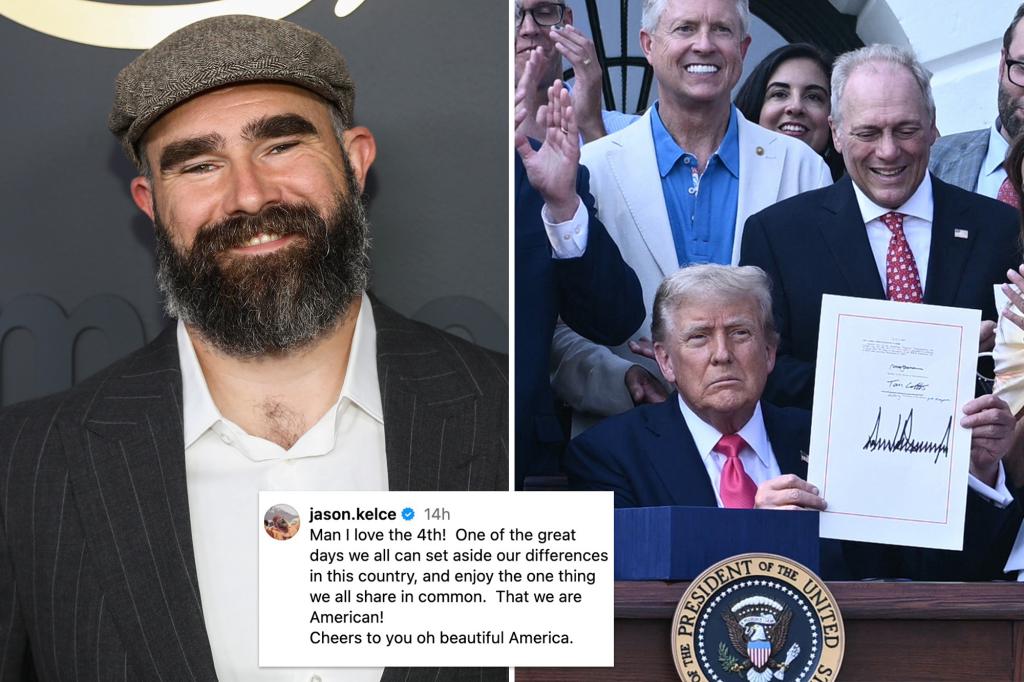Retired Philadelphia Eagles center Jason Kelce found himself in the midst of a social media firestorm after posting a seemingly innocuous Fourth of July message. His attempt to unite Americans was quickly met with criticism, highlighting the deep divisions in the country. This incident underscores the challenges public figures face when wading into political discourse, especially during emotionally charged times.
In this article, we’ll dissect the controversy surrounding Jason Kelce’s July 4th post, exploring the reactions it generated, the political context surrounding it, and the broader implications for celebrities expressing their views. We’ll examine the key arguments from both sides, providing a balanced perspective on this trending topic. Understanding the nuances of this situation is crucial for navigating the complexities of today’s polarized social media landscape. Whether you’re a sports fan, a political observer, or simply interested in the dynamics of online discourse, this analysis offers valuable insights.
Kelce’s Fourth of July Message
On July 4th, Jason Kelce posted a message on social media expressing his love for the holiday and emphasizing the shared American identity. Accompanying his message was a video of fireworks. The post read: “Man I love the 4th! One of the great days we all can set aside our differences in this country, and enjoy the one thing we all share in common. That we are American! Cheers to you oh beautiful America.”
However, this message was perceived by some as insensitive and out of touch, considering the current political climate and societal challenges. The timing of his post, hours after Trump signed his $3.3 trillion into law, further fueled the controversy, leading many to believe Kelce was subtly endorsing the president’s policies. The immediate backlash Kelce received highlights the sensitivities surrounding national holidays and political undertones.
Defenders of Kelce
Despite the criticism, Kelce also received support from users who defended his right to express patriotism and promote unity. Many argued that his message was a positive one, emphasizing the importance of shared values and national pride. These supporters saw his post as an attempt to bridge divides rather than ignore them.
One user wrote, “I am so super proud of you taking this stand and posting this. There is absolutely nothing wrong in having difference of opinion. Yes, we are one and the beauty of democracy is having the freedom of airing your position. This is what July 4th represents.”
The defense of Kelce’s post highlights the ongoing debate about patriotism, freedom of expression, and the role of public figures in political discourse. It also reflects a desire among some Americans to find common ground despite their differences.
Kelce Brothers’ Political Views
Jason Kelce and his brother, Travis Kelce, have generally kept their political views private, avoiding explicit endorsements or partisan statements. This approach is common among athletes and celebrities who often seek to avoid alienating segments of their fan base. However, their associations and relationships sometimes offer glimpses into their political leanings.
Notably, Travis Kelce’s girlfriend, Taylor Swift, publicly supported Vice President Kamala Harris in the previous election, indicating a clear political stance. While Travis has not explicitly echoed this support, his connection to Swift inevitably draws attention to his potential political alignment. The Kelce brothers’ cautious approach to politics reflects the delicate balance public figures must strike between personal expression and professional considerations.
Political Context
The controversy surrounding Kelce’s post occurred against a backdrop of heightened political tensions in the United States. The passage of Trump’s $3.3 trillion bill and the ongoing debates about social justice issues have contributed to a deeply polarized environment. In this context, even seemingly neutral messages can be interpreted as political statements.
The reactions to Kelce’s post reflect a broader trend of politicization, where national symbols and holidays become flashpoints for ideological clashes. Understanding this context is crucial for interpreting the intensity of the response and the underlying divisions within American society. The incident serves as a reminder of the challenges of promoting unity in a deeply divided nation.
Implications for Public Figures
The backlash against Jason Kelce’s Fourth of July post carries significant implications for other public figures. It underscores the risks involved in expressing political opinions, even when those opinions are intended to be unifying. Celebrities and athletes face increased scrutiny and are often held to high standards of social responsibility.
This incident may lead public figures to exercise greater caution when engaging in political discourse, opting for carefully crafted messages or avoiding controversial topics altogether. The Kelce controversy serves as a case study in the challenges of navigating the intersection of celebrity, social media, and political expression. It highlights the need for public figures to be aware of the potential consequences of their words and actions.
Conclusion
The controversy surrounding Jason Kelce’s Fourth of July post exemplifies the challenges of promoting unity in a polarized society. His attempt to celebrate American identity was met with both support and criticism, reflecting the deep divisions within the country. The incident underscores the sensitivities surrounding national holidays and the political undertones that can be easily perceived.
For public figures, the Kelce controversy serves as a reminder of the risks involved in expressing political opinions. Celebrities and athletes must navigate a complex landscape of social expectations and potential backlash. As social media continues to amplify voices and opinions, the line between personal expression and public responsibility becomes increasingly blurred.
Ultimately, the Kelce incident highlights the need for nuanced dialogue and greater understanding in a society grappling with profound divisions. Whether one agrees with his message or not, it is clear that promoting unity requires careful consideration and a willingness to engage with diverse perspectives. The lessons learned from this controversy can inform future discussions and actions aimed at bridging divides and fostering a more inclusive American identity.

Leave a Reply